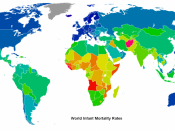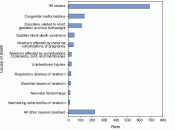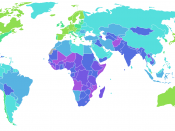Because infants are completely dependent upon others in society for survival, the rate of infant mortality (number of deaths of babies less than one year old per 1000 births in the population) which a population experiences is often thought to be one of the most sensitive indicators of how well that population is faring. In the U.S., babies born to African-American women currently experience a rate of infant mortality that is nearly 2.5 times that of babies born to White women (infant mortality rates of 18.0 and 7.6, respectively), a sizable gap that suggests large differences in the quality of life between the two populations. This mini-lecture examines three of the common schools of thought which have been advanced in trying to account for the racial difference in infant mortality and suggests a fourth, more promising perspective.
The first common perspective, or school of thought, argues that biological differences between the two groups may be important: Black babies are born smaller than White babies and, therefore, are at higher risk of infant death.
While there is a considerable difference (about 1/2 pound) in average birth weight between the races, no evidence exists to suggest that the birth weight difference is biological in nature. On the contrary, substantial evidence exists that racial differences in birth weight are largely dependent upon the differing social and environmental conditions experienced by the populations. In short, little merit is currently granted to the biological perspective.
A second school of thought argues that behavioral differences between the two groups may be important in understanding racial differences in infant mortality. Some observers point to the higher rate of unmarried childbearing and the younger age at which women give birth within the Black community as key reasons for their higher rate of infant mortality. However, married Black...


